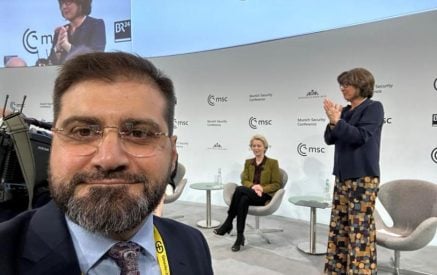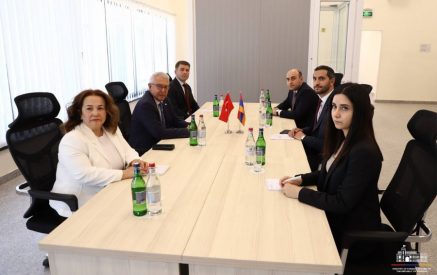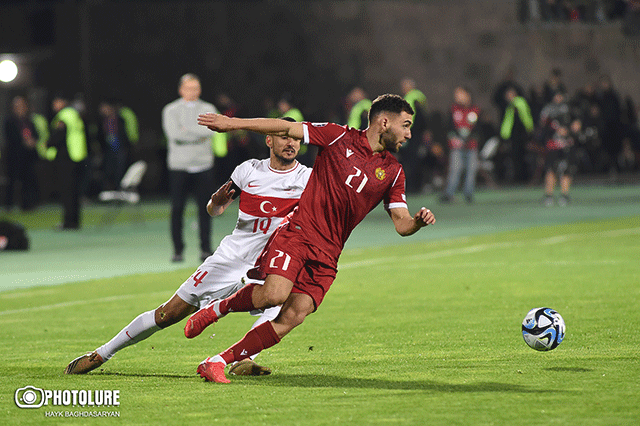Ara V.Papyan
AIISA associate fellow on International Trade, Investment Law, EU Law
LL.M in International and European Economic Law at Université de Lausanne
Read also
Ahead of the “new round” of negotiations between Armenia and Turkey, which kicked off on January 14, 2022, in Moscow, Russian Federation, there are lively debates on the potential economic expansion of Turkey in Armenia, if the borders between the countries are opened. Example of Georgia is constantly brought as one, where Turkey could achieve significant economic expansion through trade and investments, over the past decades, and many see it as an imminent threat for Armenia if the borders get opened. It needs to be mentioned that this is not the first attempt to normalize relations between the countries. There were several initiatives in the past, in 2001, as well as in 2008. [1] However, these attempts have failed due to the imposition of unacceptable preconditions by Turkey. This new round of negotiations will take place at a very complicated period of time for Armenia—one year after the second war in Artsakh (Nagorno-Karabakh), in which Turkey had active participation by supporting Azerbaijan both militarily and politically. This has added another element of tension between the countries and made normalization of relations even more complicated.
Throughout the series of articles, we will only look through one element of relations between Armenia and Turkey—the trade issue and underlying limitations in actions for both countries. The relations here are complicated at all levels—starting from Turkey’s refusal to apply the rules of international trade provided under the Marrakesh Agreement on Establishment of World Trade Organization and its Annexes, where Turkey has declared “non-application” towards Armenia in 2002, during Armenia’s accession to World Trade Organization (WTO). On the bilateral level, the situation is no better. De jure there are no relations, however, there is a considerable amount of trade between the countries. Another element, which will be necessary to look through is the participation of both countries in different trade blocs—Armenia is a Member of the Eurasian Economic Union (EAEU), while Turkey is a member of the Customs Union with the European Union. These trade blocs sometimes are regarded as conflicting ones, from political, as well as international legal perspectives. Each one has its limitations in actions, which will be necessary to analyze.
Analysis of these issues will bring to answer the concerns raised by many: will opening of the border lead to Turkey’s economic expansion in Armenia, as was the case with Georgia?
SOME GENERAL REMARKS
Open borders are important for the conduct of trade, not only between two countries but also for the transit of goods via the most efficient transport routes to the rest of the world. In case of opening the borders Turkey may gain some competitive advantage compared to other countries, since its economy is diversified, and it has strong export potential, and geographical proximity combined with lesser transportation costs will allow exporting goods at competitive prices, compared to other countries. However, this alone is not enough for Turkey to increase its trade significantly since trade does not only depend on open borders. Apart from some economic considerations, there are numerous other factors affecting the trade. To protect domestic market states, impose customs tariffs and non-tariff measures, which may serve as restraint to the trade. In case of increase of imports, which may cause injury to the industry of importing State, actions can be undertaken to restrain the imports, such as applying anti-dumping measures, countervailing measures or economic emergency measures (safeguards), which are fully compatible with international law. There are also a set of other mechanisms, which may be applied to restrain the trade.
TENSIONS BETWEEN ARMENIA AND TURKEY AT WTO
Turkey has been a Member of the World Trade Organization (WTO) since March 26, 1995. Prior to that, since October 17, 1951, it has been a Contracting Party to the General Agreement on Tariff and Trade (GATT 1947)[2], a multilateral agreement, which was mainly dealing with the conduct of international trade in the post-second World War period. GATT 1947 has become a prevalent instrument in the conduct of international trade relations after the failure of the Havana Charter on Establishment of International Trade Organization (ITO)[3], which together with the International Monetary Fund (IMF) and International Bank for Reconstruction and Development (IBRD), presently called World Bank (WB) was designed to become the cornerstone of the post-war rules-based international economic order. The scope of the Havana Charter was very broad, and it incorporated provisions relating to promotion and protection of foreign investments, international trade rules based on non-discrimination principle, provisions related to reduction of tariffs and preferences between the States, state-trading and related matters, employment issues, institutional provisions and other highly important issues. However, it was not ratified by the United States[4], and other countries abandoned the Charter due to this factor. [5]
GATT 1947 was an agreement taken from the Havana Charter itself, and it was duplicating the Commercial Policy section of the Charter, based on it Contracting Parties engaged in 8 rounds of negotiations[6] (1) Geneva Round in 1947; 2) Annecy Round in 1949; 3) Torquay Round in 1950-1951, 4) Geneva Round in 1956; 5) Geneva Round in 1960-1961; 6) Kennedy Round in 1964-1967; 7) Tokyo Round in 1973-1979; and 8) Uruguay Round in 1986-1994)) to expand and modify the framework of rules governing international trade, while the main purpose of these negotiations was to reduce the tariffs in international trade. Turkey became a contracting party to GATT in 1951 and actively engaged in the negotiations. As a result of the Uruguay Round of negotiations, the last one, the World Trade Organization has been established in which GATT 1947 was also incorporated, as one of the instruments regulating the conduct of international trade—GATT 1994, and Turkey, together with other countries joined it one year after.
On November 29, 1993 Armenia officially applied to become a contracting party to GATT 1947[7], and on December 17 of the same year, the Council of the GATT agreed to establish the Working Party for implementation of the process of accession. [8] Due to establishment of WTO as a result of Uruguay Round of Negotiations, Armenia modified its request, and at a time Prime Minister of Armenia Hrant Bagratyan addressed a letter to the WTO Director-General indicating the wish of Armenia to accede to WTO.[9] Armenia became a Member of WTO on February 2, 2003. [10]
Unlike Turkey, Armenia had been under the Soviet control, it did not participate in any of the 8 rounds of trade negotiations. This was due to the Soviet Constitution. The Union of Soviet Socialistic Republics (USSR), which according to the Constitution of 1977 included Russia, Ukraine, Belarus, Uzbek, Kazakh, Georgian, Azerbaijan, Lithuanian, Moldavian, Latvian, Kirgiz, Tajik, Armenian, Turkmen and Estonian soviet socialist republics[11], was attributed with the power of representation of these states in international relation, including relations with other States and with the international organization, in foreign trade and other forms of external economic activity. [12] Similar provisions were also laid down in earlier versions of the USSR Constitutions. The Constitution of 1936 provided that it was within the jurisdiction of the highest organs of state authority and organs of government to represent the Union in international relations, conclusion and ratification of treaties with other states[13], as well as conducting foreign trade on the basis of State monopoly[14]. Similar provisions were also laid down in the Constitution of 1924, which provided that the USSR through its supreme organs has the powers to represent the Union in its international relations; to conclude treaties, political and otherwise with other State[15], to ratify international treaties[16], to direct commerce with foreign countries and to determine the system of internal commerce[17].
USSR itself did not participate in those negotiations. At the outset, when high-profile negotiations were taking place on the establishment of the International Trade Organization through Havana Charter, US officials did not want to exclude the Soviet Union from the participation in ITO. Moreover, USSR was invited to participate in the preparation of the draft Charter but, nevertheless, did not attend it.
USSR had absented itself from GATT discussions as well, believing that the US was bent on world economic and political hegemony. [18] Despite this, at a time, several socialist republics joined the GATT 1947, including Poland and Hungary. Soviet’s attitudes towards accession to the GATT 1947 have changed afterward, and on August 15, 1986, USSR officially requested observer status under the GATT 1947 during the last, Uruguay Round of Negotiations. This was not the first time, when USSR was attempted to acquire observer status, without success. [19] The US officially opposed on USSR application to become an observer[20], nevertheless later, in 1990 the observer status was granted[21], two years before its collapse.
While referring to the multilateral level of international trade, it shall be understood as the rules of international trade established under the Marrakesh Agreement on Establishment of the World Trade Organization (WTO), one of the most important multilateral institutions in international trade. During Armenia’s accession process to WTO, specifically, starting from June 1997, Turkey has been involved in examining the application of Armenia for the accession. Turkey has been in the Working Party Chaired by Australian Ambassador D. Kenyon to examine Armenia’s application 13 times in a period of several years. [22] Even though, there is nothing extraordinary in the fact that Turkey has been actively involved in examining Armenia’s accession process, nevertheless, there was something which is of extraordinary in what happened later. On December 3, 2002, Turkey invoked Article XIII of the Marrakesh Agreement on Establishing the WTO against Armenia—Non-application of Multilateral Trade Agreement between particular Members. [23] This means, that Turkey refused to apply WTO agreements, entirely, towards Armenia, amongst which Article V of GATT 1994 on the right of freedom of transit, perhaps the most important point for Armenia, as well as State to State dispute settlement mechanism of WTO. Invocation of non-application in WTO Law has its specificities. Non-application may be notified only before Ministerial Conference approves the agreement on the terms of accession of acceding country. Turkey’s notification was served on December 3, while the General Council of WTO, conducting the functions of Ministerial Conference, approved Armenia’s accession several days later, on December 10, 2002. [24]
There may be various reasons for such invocation. However, from these reasons, we may potentially exclude the factor of potential accession of Azerbaijan to WTO, since Armenia’s Minister of Foreign Affairs has communicated with WTO and its Member States on the highest level, that it will remain committed to its constructive position regarding the expansion of the WTO Membership to the entire South Caucasus region. [25] Armenia at a time committed not to take any direct or indirect actions that would impede or slow down the accession process of Azerbaijan to the WTO and undertook not to block, in the future, the decision process concerning the accession of Azerbaijan. This commitment has been made on November 20, 2002[26], a few days before the declaration of non-application by Turkey. It also needs to be mentioned that, even though Armenia had the option to retaliate and invoke non-application towards Turkey, it has not done so.
In general, there were 12 instances, when non-application was invoked. For the most part, the United States is the country, which invoked it, against Romania, Mongolia, Kirgiz Republic, Georgia, Moldova, Viet Nam, Russian Federation, Tajikistan, and Armenia. In case of Armenia, non-application was invoked by the United States on December 3, 2002 and withdrawn on February 2, 2005. From these 12 instances, it is only the case of Turkey against Armenia and the US against Tajikistan, which keeps the regime of non-application as of the day. [27]
The question of whether Armenia has undertaken any actions to eliminate this regime, I will leave open, as there is no publicly available information on it. This topic is rarely discussed in public and there is little awareness of it. Marrakesh Agreement provides the option to refer to the Ministerial Conference of WTO to review the operation of the Article in particular cases at the request of any WTO Member. Armenia together with other WTO member states shall refer to Ministerial Conference to review the measure and recommend elimination of it by Turkey. Armenia will have the chance to raise the issue at the 12th Ministerial Conference, perhaps during 2022, if it takes place. The 12th Ministerial Conference has been postponed for an indefinite period of time, due to Covid-19 Pandemic. Elimination of non-application will create legal obligations on the part of Turkey, including one connected with freedom of transit through the territory of Turkey, since Article V of GATT 1994 provides that there shall be freedom of transit through the territory of each contracting party, via the routes most convenient for international transit, without distinction of the place of origin, departure, entry, exit or destinations, as well as any circumstances related to the ownership of goods, vessels or of other means of transport.
[1] Duygu Ozturk-Tuncel & Mitat Celikpala (2019), “Turkey`s Rapprochements with Greece and Armenia: Understanding the Path Breaking Steps”. Southeast European and Black Sea Studies, 19:3, 431-449
[2] General Agreement on Tariffs and Trade 1947 (GATT 1947), 55 U.N.T.S. 194
[3] United Nations Conference on Trade and Employment (1948). Havana Charter for an International Trade Organization, March 24, 1948
[4] For a detailed discussion on the reasons for failing please look at Richard Toye (2003). The Havana Charter and the Fight for the International Trade Organization, 1947-1948, The International History Review, June 2003, Vol. 25, No. 2, pp. 282-305.
[5] Graz, J. (2016). “The Havana Charter: when state and market shake hands”, In Handbook of Alternative Theories of Economic Development. Cheltenham, UK: Edward Elgar Publishing. p. 285
[6] 1) Geneva Round in 1947; 2) Annecy Round in 1949; 3)Torquay Round in 1950-1951, 4) Geneva Round in 1956; 5) Geneva Round in 1960-1961; 6) Kennedy Round in 1964-1967; 7) Tokyo Round in 1973-1979; and 8) Uruguay Round in 1986-1994
[7] General Agreement on Tariffs and Trade Council, Communication from Armenia L7334, December 6, 1993
[8] General Agreement on Tariffs and Trade, Council of Representatives Meeting C/M/ 268 pp. 4-5
[9] World Trade Organization, WT/L/25, 10 Feb. 1995
[10] Protocol on the Accession of the Republic of Armenia to the Marrakesh Agreement Establishing World Trade Organization, Notification on Acceptance and Entry into Force, WLI/100, on January 20, 2003.
[11] Constitution of the Union of Soviet Socialist Republics (adopted on the Seventh Special Session of the Supreme Soviet of USSR, Ninth Convocation, on October 7, 1977, art. 71
[12] Ibid art, 73 (10)
[13] Constitution of the Union of the Soviet Socialist Republics adopted in 1936, art. 14 (a)
[14] Ibid. art. 14 (h)
[15] Constitution of the Union of the Soviet Socialist Republics, January 1924, Part II, Chapter I, art. 1 (a)
[16] Ibid. Part II, Chapter I, art. 1 (f)
[17] Ibid. Part II, Chapter I, art. 1 (g)
[18] Kevin C. Kennedy, “The Accession of the Soviet Union to GATT”, 1987, 21, Journal of World Trade, Issue 2, p. 24
[19] William L. Richter, “Soviet Participation in GATT: A Case for Accession”, 20 New York University Journal of International Law and Politics., 477 (1988).
[20] Ibid No: 13 at 23, Ibid No: 14
[21] GATT Newsletter, May Council, “GATT Grants observer status to the Soviet Union”, 71 May-June 1990
[22] World Trade Organization, WT/ACC/ARM/3/Rev. 3, on 6 June 1997; World Trade Organization, WT/ACC/ARM/3/Rev. 4; World Trade Organization, WT/ACC/ARM/3/Rev. 5; World Trade Organization, WT/ACC/ARM/3/Rev. 6; World Trade Organization, WT/ACC/ARM/3/Rev. 7; World Trade Organization, WT/ACC/ARM/3/Rev. 8; World Trade Organization, WT/ACC/ARM/3/Rev. 9; World Trade Organization, WT/ACC/ARM/3/Rev. 10; World Trade Organization, WT/ACC/ARM/3/Rev. 11; World Trade Organization, WT/ACC/ARM/3/Rev. 12
[23] World Trade Organization, WTO Document WT/L/501, 3 December 2003
[24] World Trade Organization, WTO Document WT/L/506
[25] World Trade Organization, WTO Document WT/ACC/ARM/22
[26] Ibid.
[27] For full list available at: https://www.wto.org/english/res_e/publications_e/ai17_e/wto_agree_art13_oth.pdf
Democracy, Security and Foreign Policy Program (NED)
Armenian Institute of International and Security Affairs (AIISA)



























































